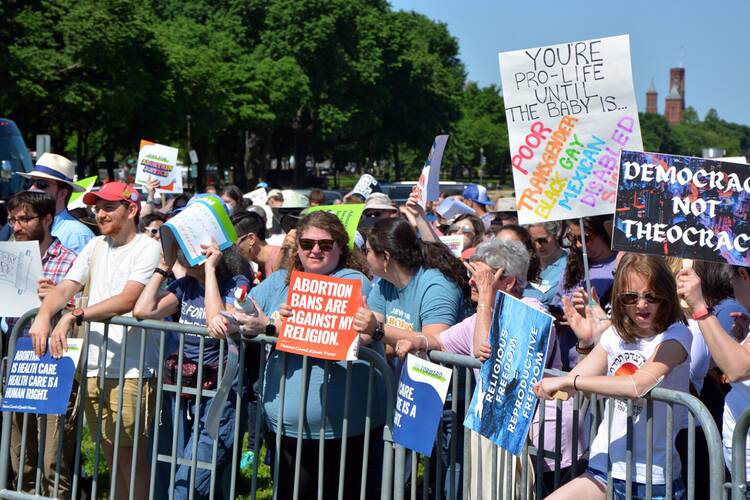Editor’s note: The Supreme Court overturned Roe v Wade on June 24 in a 6 to 3 decision, returning the issue of abortion restrictions to the states. America has published several essays on the decision, which was first leaked to the press in May. Read other views on abortion and the reversal of Roe v. Wade here.
(RNS) — Stop me if you’ve heard claims like these since Justice Samuel Alito’s draft majority opinion was leaked:
“We need to center the stories of the economically vulnerable and why they need abortion.”
“This is about privileged white men trying to control women’s bodies.”
“Laws restricting abortion are forms of white supremacy.”
All the time, right? One can’t swing one’s Gucci handbag these days without hitting a handful of privileged folks speaking on behalf of poor people (and especially poor people of color) as a way of bolstering their own support of abortion rights.
It’s true that Black and brown people are pushed to have abortions significantly more often than white people. For the last 14 years I’ve taught at Fordham University in the Bronx. During that time, the abortion rate outside our campus walls hovered around an astonishing and horrific 50 percent.
This is one of the poorest parts of the country, with very high percentages of Black and brown residents who are structurally coerced into having abortions: They often face poor access to housing, child care and health care. They often lack support for being a mother of multiple children (most women who have abortions already have one or more children) in the workplace. They face horrific levels of intimate partner violence. All of these correlate very closely with abortion.
For those in households making under $40,000 per year, only 30 percent want abortion to be legal in all cases.
But those who imagine these populations as allies in favor of abortion rights ought to think again. Indeed, in 2021 Gallup found that economically vulnerable people of color are significantly more anti-abortion than rich white folks are.
For those in households making under $40,000 per year, only 30 percent want the official position of the Democratic Party: that abortion be legal in all cases. For those in households making over $100,000 per year, those who want unlimited abortion rises to 39 percent.
Of economically vulnerable people, 42 percent want abortion legal only in certain cases, while 50 percent of those with economic privilege do. But wait for this one: 1 in 4 economically vulnerable people want abortion banned altogether, while only 1 in 10 economically privileged people want the same.
In addition, in every circumstance in the same Gallup poll, people of color were more anti-abortion than were non-Hispanic whites.
The differences were even more stark when asked about whether they identify as pro-life or pro-choice. Economically vulnerable people were +11 percentage points to the pro-life side while economically privileged people were +24 to the pro-choice side. Slightly more people of color identify as pro-life than pro-choice, while the opposite is true for non-Hispanic whites.
Those who are most likely to oppose abortion are the very folks more likely to be structurally coerced into abortion.
These numbers force us to confront a demonic state of affairs: Those who are most likely to oppose abortion are the very folks more likely to be structurally coerced into abortion.
To watch privileged prognosticators consistently invoke poor people of color to defend their abortion stances, then, is quite a spectacle. If we took the time to actually listen to these populations—if we actually centered their views and experiences—it would directly challenge Roe’s abortion-friendly policies. (Handed down from on high, of course, by a group of privileged and overwhelmingly white men.) It would challenge the Roe-delivered abortion extremism that the United States currently shares with only seven other countries.
While the pro-life movements have put many millions of dollars into pregnancy help centers and other facilities (which dwarf the number of abortion clinics) to try to help these women over the last five decades, it must be said that much more could and should have been done to address the structural problems and failed public policies leading to such diabolical outcomes.
Happily, the libertarian hold on the Republican Party—and, by extension, much of the pro-life movements—is beginning to wane. Religious pro-lifers especially are making significant moves to address so-called abortion demand.
The United States Conference of Catholic Bishops announced last November its new project, titled: Walking with Moms in Need. (The California bishops have their own plan, titled “We Were Born Ready.”) The Ethics and Public Policy Center recently announced its Life and Family Initiative. The de Nicola Center for Ethics and Culture at Notre Dame University has created a Women and Children First initiative.
Abortion is an “unchoice” for those without power and privilege. They don’t want violence. They want justice.
These efforts are certainly better than those by corporations such as Amazon that tirelessly work to undermine worker-friendly benefits in favor of profits for their shareholders, even as they offer the violent “choice” of abortion to their employees. Heck, they’ll even pay women to travel to go get an abortion rather than actually provide support for them to be both mothers and Amazon employees.
Abortion is an “unchoice” for those without power and privilege. They don’t want violence. They want justice.
If the chattering classes are interested in learning more about why the popular narrative about economic vulnerability, race and abortion is false, I commend the following Black voices to you, just as a start: Gloria Purvis, Justin Giboney, Monique Chireau Wubbenhorst and Connecticut State Representative Trenee McGee. They will absolutely blow your mind, and there’s (much) more where they came from.
For the rest of punditry: Advocate for abortion rights, if you must. It’s now clear that you’re on the wrong side of history—if history is bending toward nonviolence and lifting up the voiceless and marginalized. But when you advocate, stop invoking folks as allies who do not, in fact, share your views on abortion.








